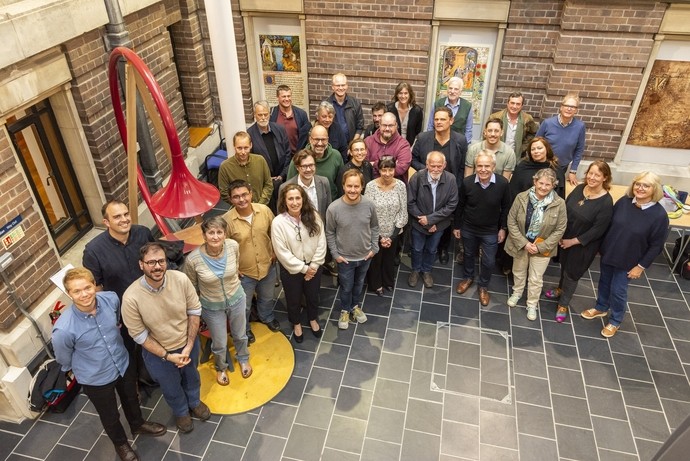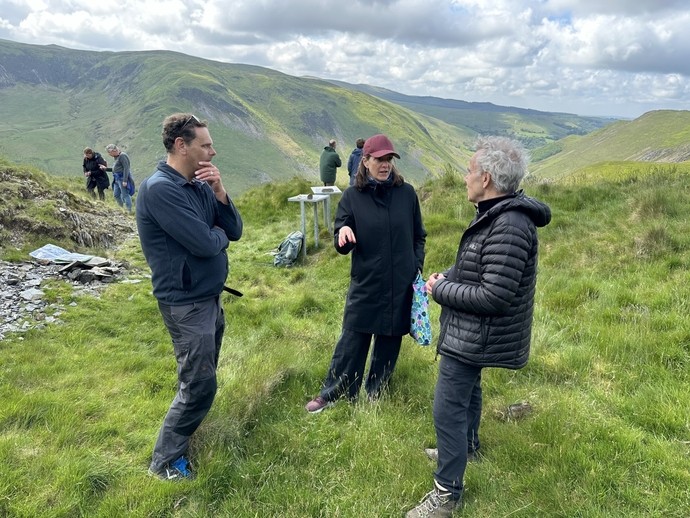‘The significance of the boom and bust of Bronze Age mining in Wales for Scandinavia, England and Atlantic Europe’
The University of Wales Centre for Advanced Welsh and Celtic Studies (CAWCS) held an international conference on 3–6 June 2024 that looked at Bronze Age mining and metals and the long-distance contacts between Scandinavia, Wales and beyond.

The conference also helped build new frameworks for exploring implications of Bronze Age trade for maritime transport, migration, social change, and contact between prehistoric languages.
Recent chemical and isotopic analysis in Nordic Bronze Age tools and weapons indicates that important sources of their metal were ancient copper mines near Aberystwyth in mid Wales from 2100–1700 BC and Great Orme in north Wales from 1700–1400 BC.
Two days of talks and panel discussions were held at CAWCS and the adjacent National Library of Wales. Speakers included experts from Wales, England, Spain, Brittany, Scandinavia, and America. A day-long site visit took participants to Beaker Period and Early Bronze Age (2200–1700 BC) copper mines in Cwmystwyth with the leading expert on the sites (Dr Simon Timberlake, Cambridge). The mining tools found at these sites included many stone hammers worked from large sea-rounded pebbles, brought up the valley from the coast, where Aberystwyth now sits at a natural harbour, below the prehistoric hillfort of Pendinas, with its long views along the coast and up the Ystwyth valley towards the mines. A second day-long site visit took participants to the Middle Bronze Age (1700–1400 BC) mine at Great Orme with the leading expert on the site (Dr Alan Williams, Liverpool and Durham).

The conference set up specific networks and initiatives to investigate implications of the ‘boom and bust’ of Wales’s Bronze Age copper mines and looked at the place of mining, metals and long-distance exchange in greater Bronze Age processes—cultures, populations, and languages.
Conference organiser, Professor John T. Koch from CAWCS, said: ‘There is such a wide awareness in Wales of the importance of mining for modern social, economic, and political history. It has affected so many people, in their family background and in shaping the places they live in a wide variety of ways. When you explain that mining in, and mining exports from, Wales go back 4,000 years, that’s startling news. It sparks an immediate interest beyond the usual audience for specialist research’.
Professor Elin Haf Gruffydd Jones, Director of CAWCS, said: ‘We’re delighted that the conference is being hosted here in Wales, at the University of Wales Centre for Advanced Welsh and Celtic Studies, at the National Library of Wales and at the site-specific locations that are of such significance to the research field. I’d like to congratulate the project lead Professor Johan Ling at Gothenburg University and Professor John T. Koch on the curation of the conference and also thank Sweden’s central bank for their support of the research project on ‘Maritime Encounters’.’
The conference builds on a wider 6-year multidisciplinary research programme called ‘Maritime Encounters: a counterpoint to the dominant terrestrial narrative of European prehistory’. The project includes 17 specialists from archaeology, historical linguistics, genetics, oceanography, and anthropology based in 8 countries. The project aims to create a more detailed and nuanced story of how prehistoric societies realised major and minor sea crossings, organised long-distance exchange, and ways of life by the sea in prehistory. For more information see: https://www.gu.se/en/research/maritime-encounters
Notes for Editors
Contact: Dr Angharad Elias (Admin Officer) a.elias@wales.ac.uk
1. The Centre for Advanced Welsh and Celtic Studies (CAWCS) was established by the University of Wales in 1985 as a dedicated research centre conducting team-based projects on the languages, literatures, culture and history of Wales and the other Celtic countries. It is located in Aberystwyth, adjacent to the National Library of Wales, which is an internationally renowned copyright library with excellent research facilities.
2. CAWCS offers unique opportunities for postgraduate students to work alongside specialists in a dynamic and supportive environment. We welcome enquiries about MPhil/PhD topics in any of our research areas. For more information about research opportunities, or for an informal chat about possible topics, contact our Head of Graduate Studies, Dr Elizabeth Edwards: e.edwards@wales.ac.uk
3. CAWCS is the home of the Dictionary of the Welsh Language, which celebrated its centenary in 2021: https://www.welsh-dictionary.ac.uk/
Further Information
Arwel Lloyd
Principal PR and Communications Officer
Corporate Communications and PR
Email: arwel.lloyd@uwtsd.ac.uk
Phone: 07384 467076
